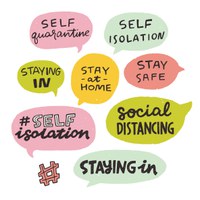The Coronavirus Pandemic and Teens Ages 14 to 18 Years Old (FS1959, April 2020)
Availability: Web only
(iStock)
Common Reactions of Teens
• Disbelief, resistance, frustration
• Feelings of invincibility – that can’t happen to me!
• Discouragement, disillusionment and pessimism about life, people, changes
• Mood swings, irritability, anxiety, emotional distance and isolation
• Acting out, engaging in risky behaviors, substance use
• Thoughts about the future, concern about well-being of themselves and others
• Upset about missing events, school and friends
• Desire to help others, take action
(iStock)
What to Say and Do
• Encourage expression of feelings and listen. Allow for continuing discussion of events; make time to talk and provide reassurance.
• Discuss the pandemic with your teens. Assess how they feel, what they have heard and where they go to check the information they are receiving.
• Establish and maintain consistent routines that involve teens such as family meals, normal bedtimes and waking times, school work, daily chores and playing games with family members. Teens also need time to connect with their friends. Social networks are very important to this age group.
• Develop a plan with teens for action if someone in the household becomes ill with the virus. This may include knowledge of contact information, awareness of first aid or simply planning next steps.
• Involve teens in meaningful service activities that can be done safely. For example: cutting out and sewing masks for home use, recording family members’ medication schedules for easy access in case they fall ill. Parents working from home or away may need teens to help care for younger siblings or assist them with their schoolwork.
• Engage teens in leading activities that relieve stress. Include safe outdoor activities, yoga or stretching exercises, daily games, jokes, music and art.
• Slow down and help teens appreciate the positive things in life. Sheltering at home may be especially difficult for this age group, but staying home saves lives and that message is important for everyone in the community.
Share stories of people in history who have chosen to be resilient. Ask your teens to do some family or community research. Have them call family members and ask them about difficult events they have encountered in their lives. The call will be “medicine” for the teen and the older family member.
For the complete publication, go to: www.ag.ndsu.edu/publications/kids-family/talking-to-children-about-pandemics
Images by iStock



